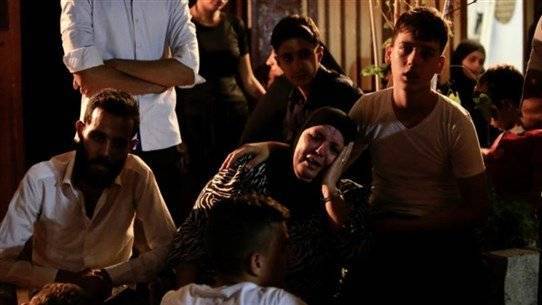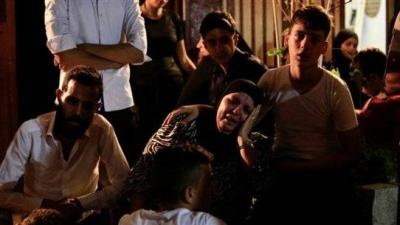Tripoli and its neighbors maintained calmness after dozens of their residents drowned in a boat for illegal immigration off the shores of Tartus in Syria. This contrasts with the anger that took hold after another similar boat sank off the coast of Tripoli six months ago. It seemed as though the people of Tripoli had resigned themselves to fate while awaiting another drowning incident.
In front of the sand graves, several young men sat outside a café discussing the latest news from Tartus. With slight shock and astonishment, they added names to the list of drowned people from their neighbors and relatives who would be buried here instead of in Europe. The young men exaggerated their indifference toward the new tragedy that struck the north. “It’s their luck and fate,” one of them said, justifying that the Tartus boat “sank by fate and was not deliberately sunk like what happened in Tripoli.”
3 Attempts to Immigrate
The man admitted that his justification implied an agreement to continue the series of illegal sea migration. Another young man interrupted to affirm that he too would attempt it if he found a way. “Here we’re just wasting oxygen,” said the cousin of Azmi Bubou, who is still missing along with his son Ahmed, while his other son Amjad is in intensive care at Al-Basel Hospital in Tartus. Azmi, who worked as a security guard at a private company, sold his house, car, and his wife's jewelry to pay for the smuggling costs. The three attempted to cross the sea for the first time a month ago, but military intelligence stopped them with dozens at a house in the Miniyeh while they were preparing to board the boat. They were briefly held in military intelligence custody before being released. They tried again more than a week ago, but Turkish authorities stopped and deported them. Until last Wednesday night, when the third attempt was successful. One of Ahmed's friends (17 years old) tried to dissuade him from throwing himself into the sea after two failed experiences. “He didn’t see it as an omen of doom, but said: Here, we die slowly. In the sea, we either die quickly or reach Europe, escaping hell.”
Opposition to Migration Prohibition
In Bab al-Raml, the home of the Mesto family was packed with mourners for Mustafa Mesto and his daughters Diyar, Roida, and Dena, while his wife Hamida was in intensive care with her father. A crowd of journalists with their cameras climbed the decrepit stairs to the house. An elderly woman leaned on a cane and the light of mobile phones to reach her home on the fourth floor, holding a nearly empty loaf of bread and muttering every time she heard wailing: “Oh my!”
The small Mesto home was accustomed to crowds. For years before the economic crisis, the father and mother lived there with Mustafa and his family, as well as his brother and his family. The two brothers could not afford to rent a separate place. Recently, Mustafa had to sell the taxi he depended on and then rented a car to work as a taxi driver. Amid the sound of the Sheikh reciting the Friday sermon from a nearby mosque, young men and women gathered on the balcony. They were displeased with the Sheikh’s prohibition against traveling by sea, arguing that it was “throwing oneself into destruction.” Maya (29 years old) asserted that she might follow in Mustafa's footsteps. While awaiting the arrival of the bodies of Mustafa and his three daughters, the eldest of whom is ten years old, she recalled that it was her birthday yesterday. “I don’t want to remember. I am in a state of depression, along with many of my friends and colleagues. I work from dawn till dusk, and my salary is barely enough to cover transportation costs. Many days, I deprive myself of food with my colleagues so that we don’t have to buy meals during work.”
Rwan (24 years old) believes there is a plan to cast all of Tripoli into the sea. “Most Tripolitans have degrees. But what good is it? I have an exam at the Lebanese University in Beirut next week, but the professors are on strike.” Meanwhile, Ali (30 years old) pointed to the gallons and barrels of water piled in the corners. “I work in the sales department of a company during the day and fill water in the gallons at night to take home to my family. This is how they have brought us back to ancient times. No water, no electricity. In the street I go to, the only lighted building is the home of the Minister of Interior!”
In the upholstery workshop opposite, Abu Ahmad and Abu Arab could not hold back their tears for their relative Mustafa. Abu Ahmad’s son-in-law chastised him. “He’s tried a hundred times. Once, he entered Ukraine with his family on a legal visa but was deported. Then he tried to enter Europe through Turkey and failed.” He ignored family advice to stop. “He left the neighborhood twenty days ago, secretly and without saying goodbye. He claimed he was staying with friends in Akkar and would return soon. This is how the smugglers operate,” Abu Ahmad said.
Loss of Trace
But the family of Mr. Ali, suffering the greatest tragedy, wishes they knew the fate of their sons like the Mesto and Bubou families. Ahmed took his son Nour, his first daughter, and his second daughter with her three children. Their goal was to catch up with Mari, Ahmed’s wife, who had gone to Germany two months earlier for cancer treatment. She did not take the sea route because her body could not handle it. She left for Turkey by plane and then crossed illegally into Germany, where her brother lives. Tawfiq, Ahmed’s brother, justified the family’s desire to emigrate, saying that Mari “suffered a lot due to her need for chemotherapy.” After successfully reaching Germany, Ahmed attempted several times to join her. In one attempt, military intelligence stopped him, and in another, he and his family reached Cyprus but were deported. In the last attempt, the two daughters and three grandchildren drowned, and Nour disappeared. As for Ahmed, he appeared in a video helping to transport bodies and rescue survivors. “But after his eldest son went to Tartus to meet him, he found no trace of him, and he will return alone at night with the bodies of his sisters and the children,” Tawfiq said.
In the small family home in al-Qubbeh, a bed in the gathering room for mourners was covered with a blue sheet. It was the temporary coffin for whoever arrives first among the children’s bodies. It could not accommodate all six victims. However, the family understands they will arrive in batches, and the funeral is open. Ahmed’s mother cannot comprehend what happened. She accepted the news of her son and grandchildren’s deaths. But the possibility that her son is alive yet missing placed her in the turmoil that families of victims lost at sea from Tripoli have been suffering for the past six months.
Arrest of "King" of Smugglers
After the illegal immigration boat departed from the Miniyeh coast last Wednesday night, a force from the army intelligence branch in al-Abda arrested Bilal D., referred to as the "king" of smugglers. A resident of Babbineh Akkar, he is responsible for the journey of the boat that sank the following day off the shores of Tartus, Syria. However, a security source confirmed to “Al-Akhbar” that his arrest coinciding with the sinking of the boat was coincidental. “There was a decision to arrest him after he orchestrated the second trip within two months. After thwarting attempts several times from the al-Abda coast, he changed the launching point to Miniyeh.”
Bilal has a lengthy record with security agencies. “For a while now, he has been hiding from view and is known for past offenses, including drug use and trafficking, and is known for his brutality in dealing with travelers. During the last voyage, despite the small fishing boat being crowded with 170 passengers, he forced the captain to sail after the latter hesitated due to high waves, excessive cargo, and running out of fuel. He instructed three armed men to board the boat and force it to sail,” the source stated. There was a rumor that “the captain jumped from the boat a few hours after departing to another boat, believing the boat would sink.”
Bilal has been in custody for three days at the intelligence directorate. However, five other major smugglers from Babbineh remain free: three from the Ayza family, a fourth from the Saad al-Din family, and a fifth from the Bustani family. While citizens hold the security agencies responsible for securing the shores to prevent smuggling, the agencies themselves complain of a lack of resources and capabilities to distribute monitoring points along the vast northern shores, in addition to the collusion of some security personnel in facilitating the boats’ departures for bribes. The source discussed the “chaos plaguing the people smuggling sector after various parties entered the scene. We are dealing with mafias that have many arms and legs, earning no less than $300,000 for each trip.”
The Third Disaster in Nahr al-Bared
As the sound of an ambulance echoed in the main street of Nahr al-Bared yesterday, crowds rushed behind it, believing it was carrying some of the bodies of victims who drowned in the Tartus boat. Since early morning, people sat on either side of the pothole-filled road. They took shelter under buildings that had not been rebuilt despite 15 years since the end of the war that devastated the camp and exchanged names of around 37 people who were on the boat. Until last night, the fate of 24 was confirmed dead and three were survivors. But that’s not all. There’s another group, whose size is unknown, that embarked on another boat that set off simultaneously with the sunken one, raising the total number of passengers from the Nahr al-Bared camp on the two boats to 70. “Where are our children? On which boat? Are they missing or alive, or did they cross the territorial waters to Europe?” one individual asked.
Illegal immigration is not strange to the camp. For decades, due to the well-known conditions faced by Palestinian refugees, hundreds have left by land to Europe before the maritime route emerged. But this mass death weighs heavily. “It’s our third Nakba after the Nakba of Palestine in 1948 and the Nakba of 2007 when the camp was destroyed during the Lebanese army’s war against terrorists,” said Arkan Badr, a member of the Democratic Front for the Liberation of Palestine. He detailed the anguish: entire families like the Ismail and Hassan families have perished.
Among the crowds waiting for the bodies of the drowned, many asserted that they would not stop escaping toward the sea. Ali, who returned a month ago after being deported from Turkish Cyprus due to a failed trip, admonished them. “I sold everything and returned to nothing. But the sea is treacherous. I won’t do it again. I almost died; I actually died.”




